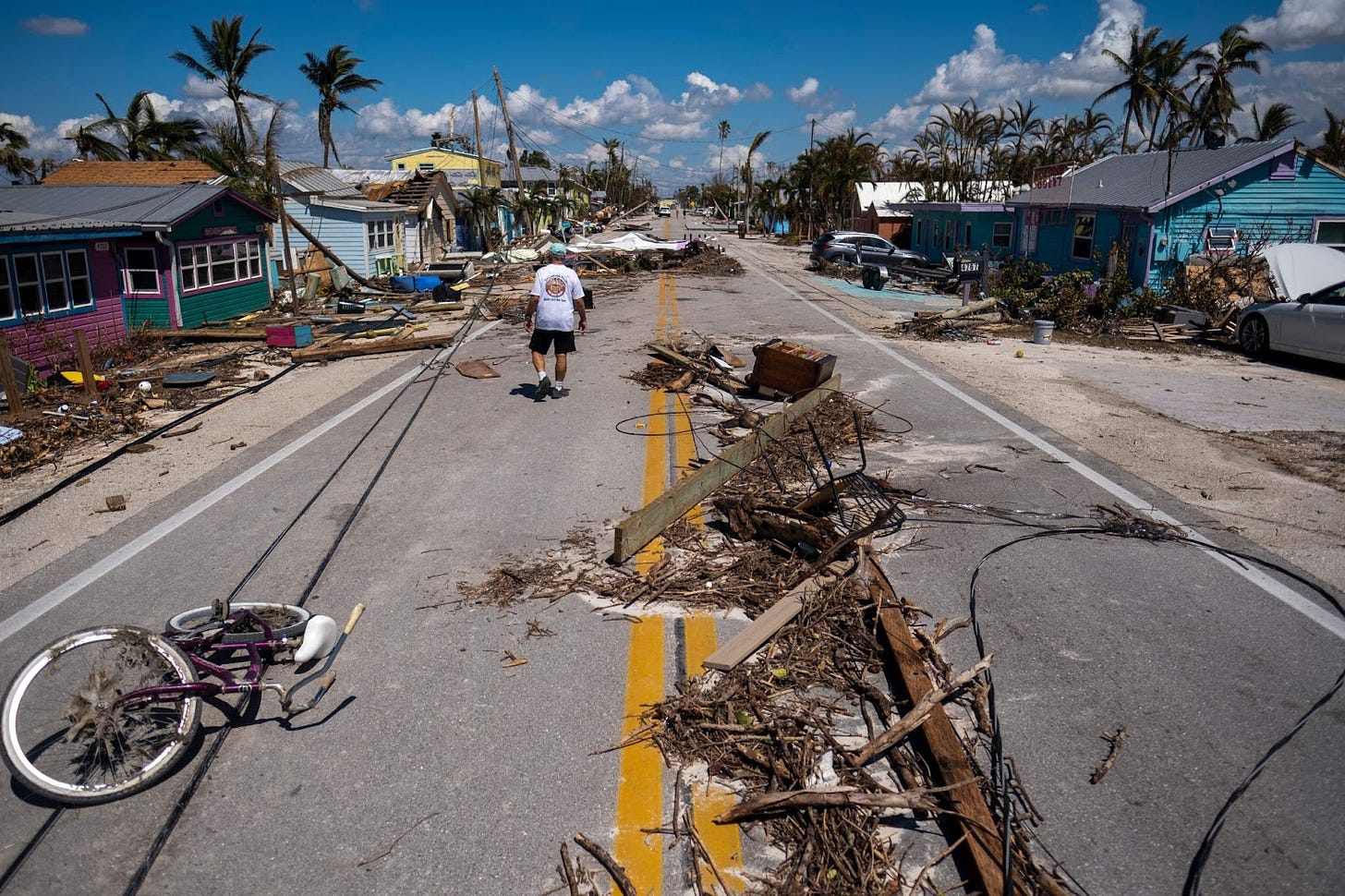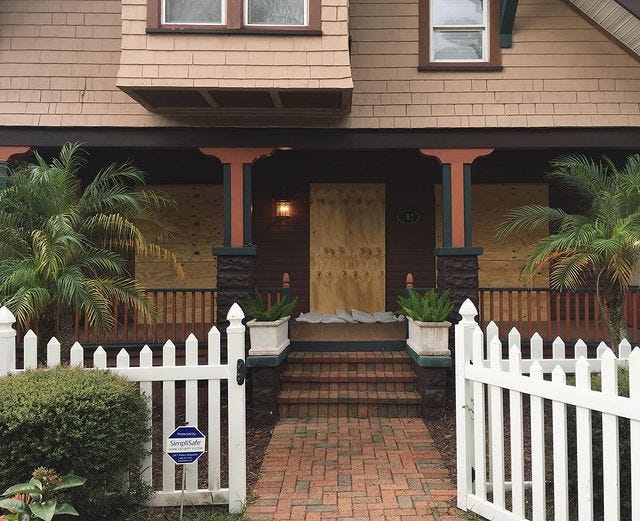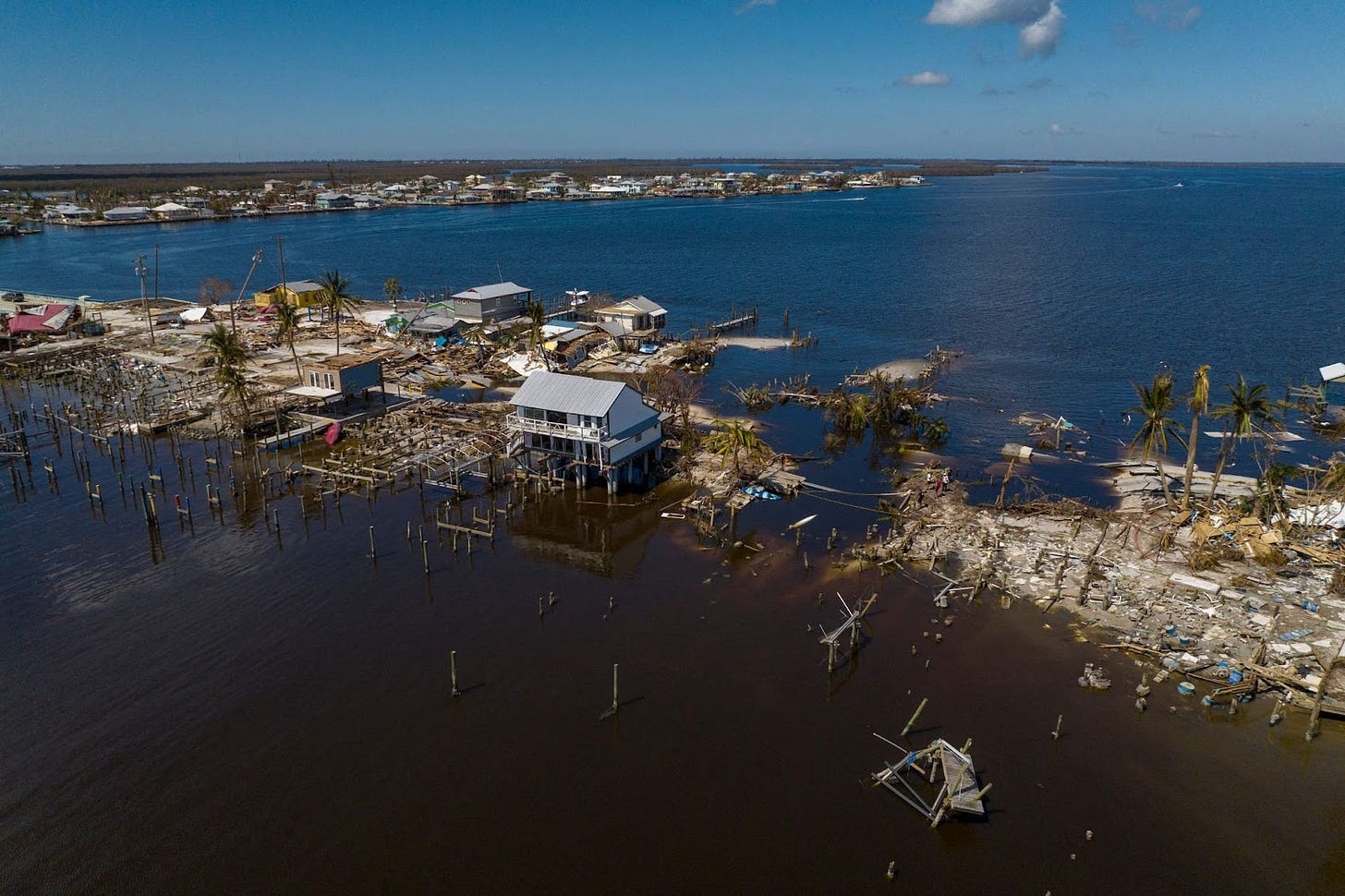Four years ago this week, I started planning a work trip to Fort Myers and Naples, Florida. I booked hotels, exchanged emails with various folks, and did a little research on what to do in both areas while I wasn’t working. I also invited my partner Billy to come along—the cities were a little over two hours’ drive away from St. Petersburg, where we lived, and I figured it’d be a fun opportunity for us to enjoy some time together.
I’ve been thinking about that trip a lot lately, after watching the region get pummeled by Hurricane Ian. I admittedly didn’t get much time to explore—my visit was mostly spent in the News-Press offices—but I remember how serene the area seemed, how perfect the weather felt in late October, and how nice everyone was. I remember the little Mexican restaurant where Billy and I grabbed dinner and talked about our respective days. I remember feeling grateful for living in Florida, a place surrounded by water and soaked by sunshine, where nearly every day was a bit like vacation.
Of course, last week, living in Florida felt nothing like a vacation. It was a nightmare. Deciding whether to evacuate or stay put. Wondering where Hurricane Ian would hit, and how bad it would be. Witnessing the storm’s wrath, either from afar or from inside wind- and water-battered homes. Worrying for days on end. Feeling conflicted about the place you’ve decided to call home.
“This is Florida’s Faustian Bargain,” my friend Stephanie Hayes wrote in the Tampa Bay Times:
In exchange for near-constant vacation conditions, we spend six months a year tracking pockets of humidity and low pressure that could wipe out everything we know and love in hours. Tropical Disturbance. Tropical Depression. Tropical Storm. Bottled water. Batteries. Canned tuna. Wait. Wait. Wait. When it arrives, we pinball around the state seeking refuge, sometimes hounded by the storm wherever we go.
We can be honest here, right? The terror gets so wearying. God. Sometimes, I just want to leave. Sometimes I wonder why any of us choose to live in a place where weather catastrophes loom so large that meteorologists become folk heroes. I wonder why we accept this dance with nature, the risk intensifying each year alongside the changing climate.
Unlike me, Stephanie hasn’t left. She’s lived in Florida for nearly three decades. In that time, she’s seen her share of hurricanes and hurricane parties, near misses and nail biters. Today, she’s an award-winning columnist for the Times, someone who clearly loves the area she lives in, despite its downfalls.
I lived in Florida for six years, enough time to make lifelong friends and memories, but not long enough to call myself a local. When Jamie and I moved to St. Pete in January 2015, I fell in love—hard and fast. I was in a low spot when we moved, still deeply grieving my dad’s death, sorting through the burnout of working in 24-hour news, and sad about leaving behind a city we loved and a wonderful community of friends.
But arriving in Florida—especially during the state’s glorious winter—made me feel like a fog had lifted. Within a few weeks, I stopped taking antidepressants. Within a few months, Jamie and I made some of our closest friends. Within a year, it was hard to imagine living anywhere else.
Our first experience with a hurricane in the Sunshine State came in September 2016, when Hermine made landfall as a Category 1. I documented the occasion on Instagram, with a basic “first hurricane” caption, clearly not too stressed about the situation. For Jamie and me, it was a bizarrely fun experience—our rite of passage as Florida residents! Now, I can’t even recall if we lost power. It was, as Stephanie put it, “[not] much to write about compared to others, but you always remember your first.”
My next experience with a hurricane was much different. For starters, I experienced it alone. Hurricane Irma barreled toward Florida in September 2017, seven months after Jamie’s death. Again, I documented the storm on Instagram, but this time I took the Category 4 hurricane much more seriously. I posted a photo of my beautiful old home, boarded up thanks to some incredible friends, with a caption that was equal parts sad and angry.
I did not stay in Florida to ride out Irma. I evacuated to Atlanta, where I was soon headed for work anyway. I stayed with my mom and nervously consumed the hurricane coverage from afar. Like Ian, Irma was projected to hit St. Pete and the Tampa Bay area, but made a sharp turn at the last minute.
As I anxiously watched Weather Channel coverage and texted with people back home, I slowly began to realize that things would be okay. My home was intact, my friends were safe, my neighbors were unharmed. It was a relief. But what I mostly felt was sadness.
When a hurricane makes a sharp turn at the last minute, it means that one area is spared while another gets hit. It means that the people who are affected don’t have as much—or any—time to prepare for the storm. It means that the relief you feel is likely tinged with guilt.
In 2017, the relief of not losing my home made me even more angry that I did lose Jamie just months before. As the storm waters receded, all of my anger over Jamie’s death came flooding back. Irma’s last-minute shift was proof that, sometimes, the worst doesn’t happen. But, for me, the worst did happen on the day that Jamie died. And unlike rebuilding a home, you can’t bring back someone from the dead.
For many people, including those living in southwest Florida and western Cuba, their worst happened with Hurricane Ian. Scores of people died. Houses were leveled. Residents’ senses of safety and normalcy were shattered.
For those of us who didn’t experience the worst, life went on. Another day, another disaster averted.
At the time of his death, like many people in 2016 and 2017, Jamie was obsessed with Hamilton1. He knew all the words, and dreamed of getting to see the show live—something he never got the chance to do. The musical begins with a mention of a hurricane, a theme that plays throughout the performance. Later on, the song “Hurricane,” marks a pivotal point in the plot.
Of course, Hamilton is about much more than a hurricane. It’s about the life of American Founding Father Alexander Hamilton, and the legacy of his wife, Eliza, who lived for 50 years after his death.
Early on in the musical, upon sharing the news of her pregnancy, Eliza sings to Alexander, “Look around, look around, at how lucky we are to be alive right now.” Later, in the wake of their son’s death, Alexander evokes those same words to Eliza.
For many of us, the death of a child is the greatest loss we can imagine—so horrible we don’t allow ourselves to imagine it. In the musical as in real life, the Hamilton family moves to uptown New York after Philip’s death. But the sadness comes with them.
In the aftermath of a hurricane like Ian, there’s no shortage of distant bystanders who wonder why people would choose to live in a place like Florida. The truth is, there’s no guaranteed amount of safety wherever you live. No matter how much money, privilege, or luck you may have, disaster can always strike. A tornado could hit your home. An accident could happen. A child could die.
If you really think about it—how fragile our lives and existences really are—it can drive you mad. Which is exactly why we don’t think about it all that often.
Sometimes, though, we can’t help but be reminded of how tenuous it all can be. Sometimes we watch hurricane footage or read another horrible headline and can’t help but imagine what it would be like if we were in that situation.
To an extent, this is a good thing. It keeps us looking around, realizing how lucky we are. There’s a reason that Floridians love their state so fiercely. The risks that come with living in Florida are what make the normal days—the truly beautiful days—all the more special.
Looking back, that first hurricane I experienced alongside Jamie was nothing. The storms I’ve withstood since then have been much greater. They’re the type of storms I couldn’t imagine facing at all, much less on my own. But I did. I’m still standing. I am lucky.
We could all say the same. To be alive is to be lucky. No matter the hardships that life will bring us, and there will be plenty, we can always look around and find something to be grateful for.
Watching Ian weave its path of destruction last week—from Atlanta, where I now live, close to family and with a family of my own—I felt that sense of luck. It’s luck tinged with sadness. It’s luck that you know won’t always last. It’s luck that isn’t earned, but nonetheless deserves to be appreciated.
“We can say it. We are so lucky,” Stephanie wrote in her post-Ian column. “With a slight sea change, we would not be the ones puttering around our yards, waving at neighbors, picking up stray palm fronds, hoisting bottled water back into storage. We are standing, impossibly, again.”
xoxo KHG
I often wonder what he’d think of the musical today. Today’s issue for paying subscribers includes some more thoughts on that subject.








I have been writing in recent weeks about the wildfire in California. My good friend who lived five minutes from me moved about two months ago to Florida. She managed to avoid the wildfire but unfortunately experience the hurricane, luckily her home was spared. Nature will always be shaping our lives. As you say, it's what we do with the experience that matters. I am posting tomorrow about an illness I experienced over thirty years ago that still reminds me to be grateful for my health and the use of my hands. Thanks, Katie! 💟
I recently moved with my husband to the Gulf Coast of FL. We left Atlanta after 30+ years because we were done with all of it's trouble; traffic, # of people, fast pace, etc. It has been a pleasant move and we are happy that we did it but we knew what were were potentially getting into weather wise by moving to FL. We downsized dramatically and the little we have left isn't hurricane proof but most of the important things would go in a car (or two) if we needed to evacuate. Living on the coast is glorious. We'll see how I still feel after a few more hurricane season stress outs.